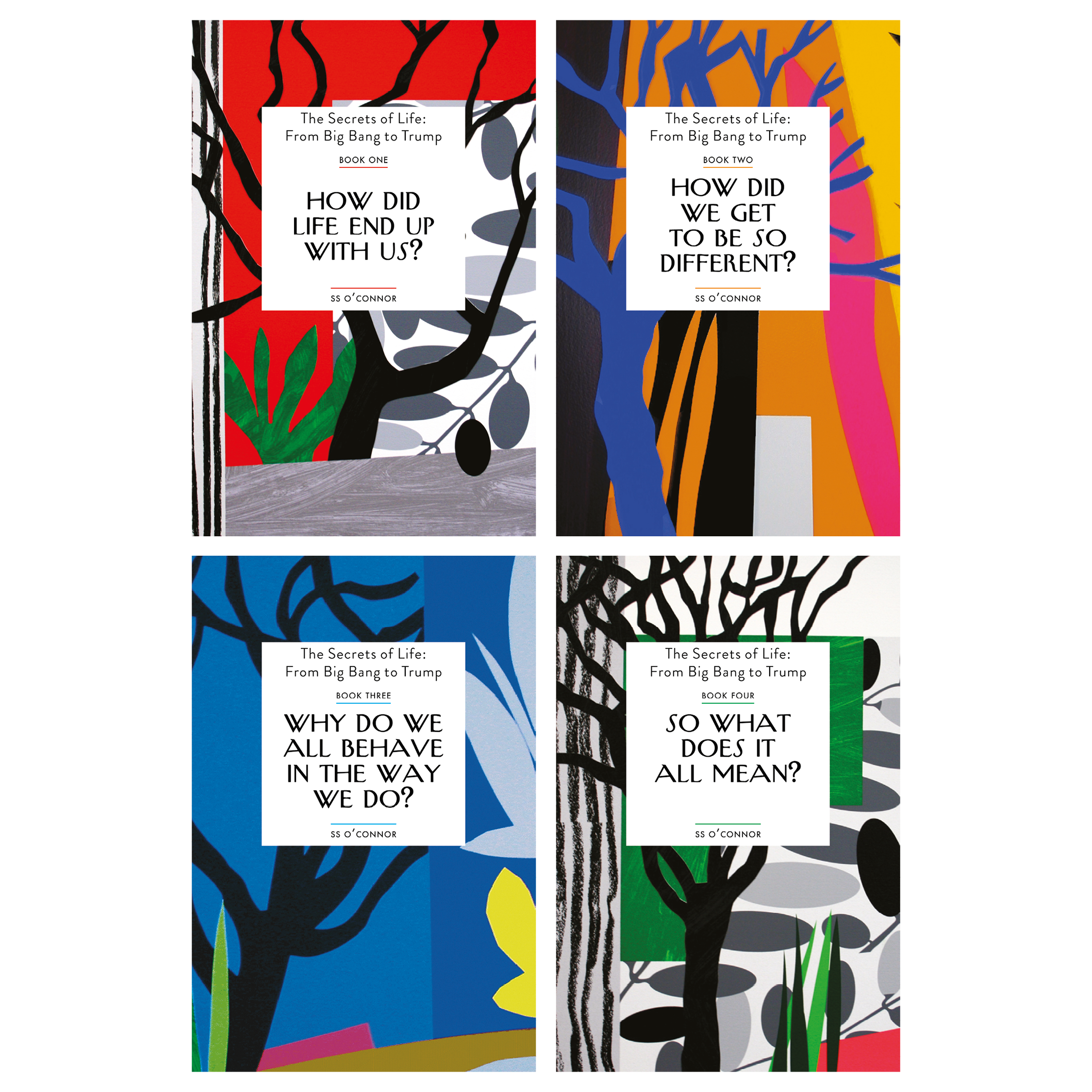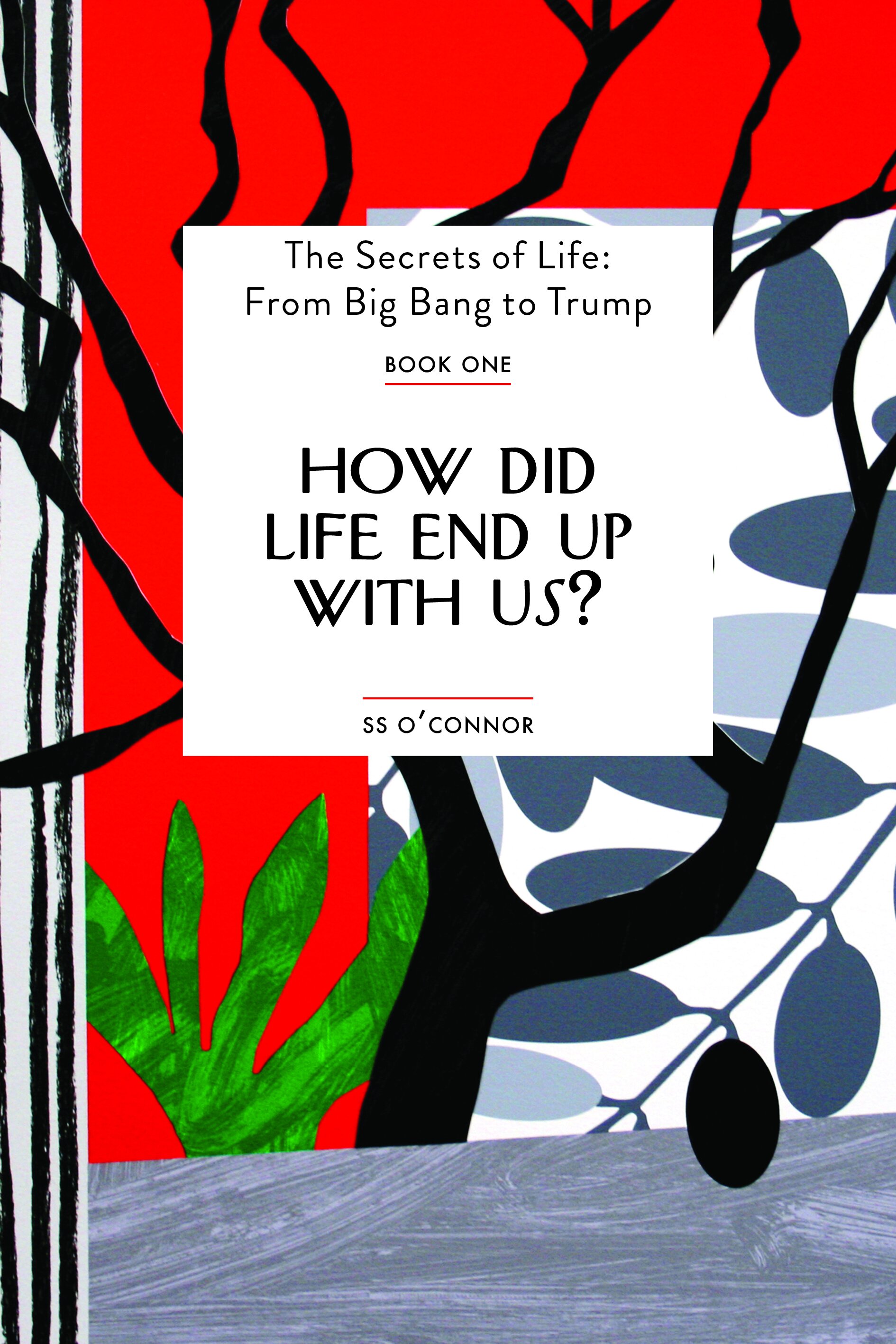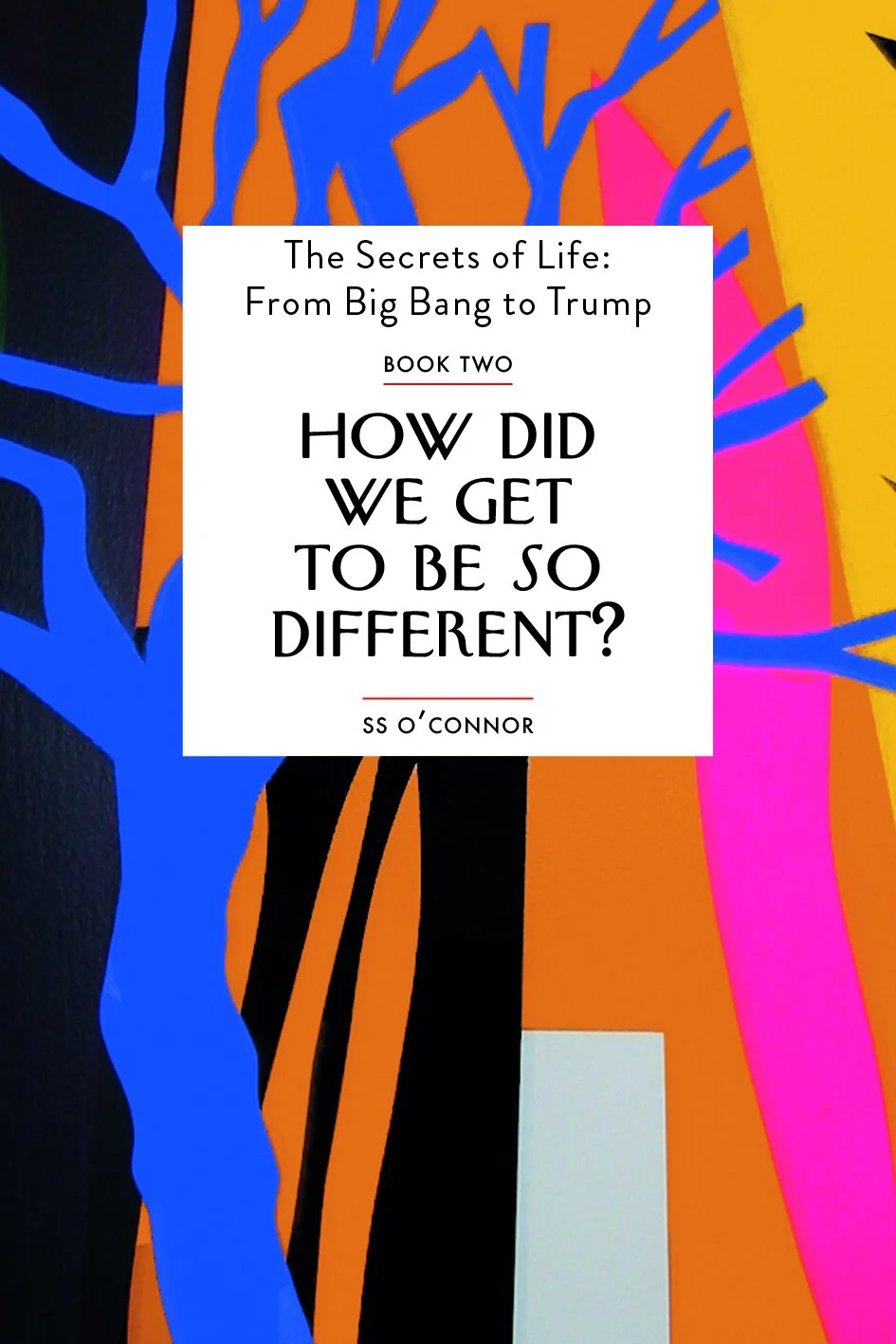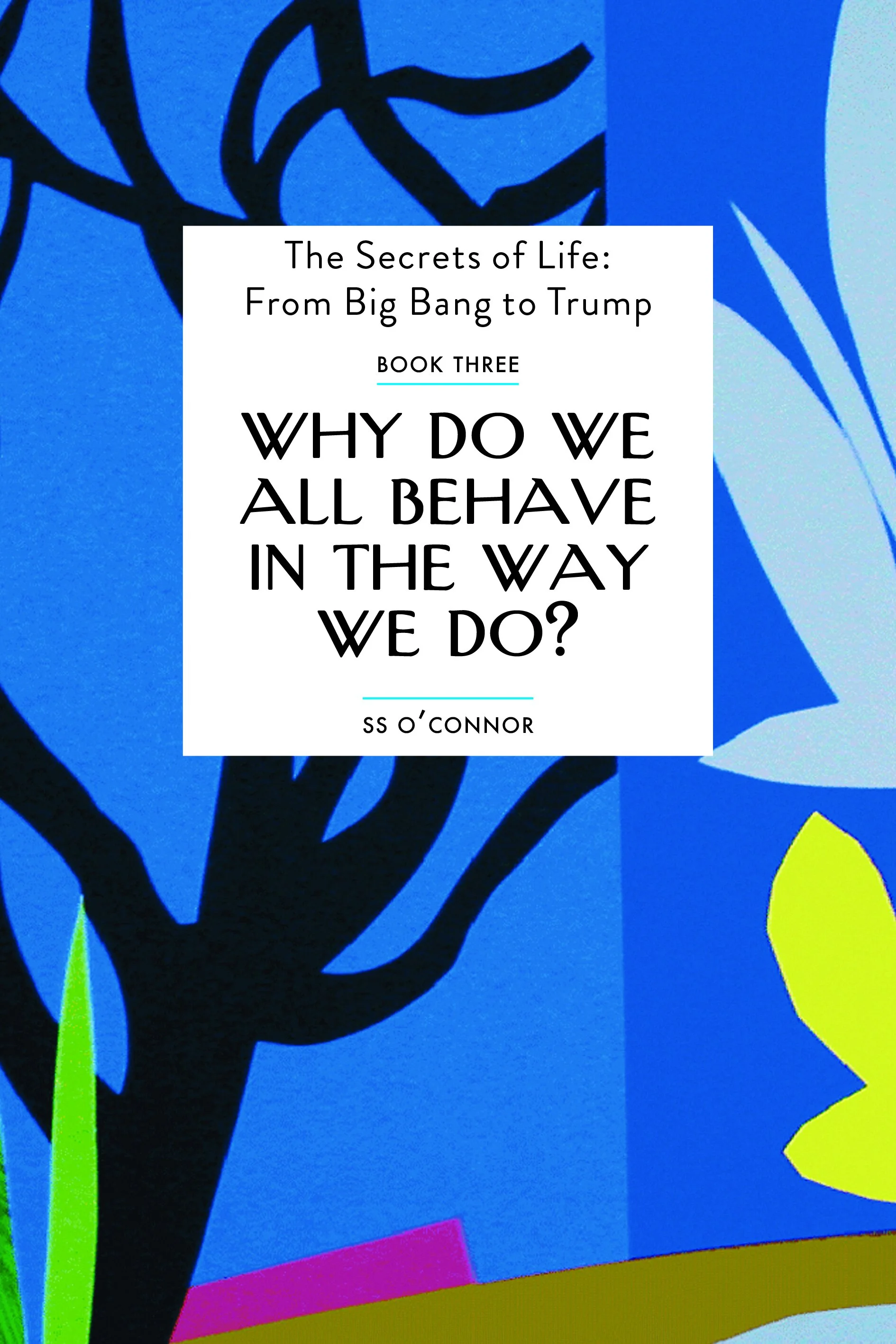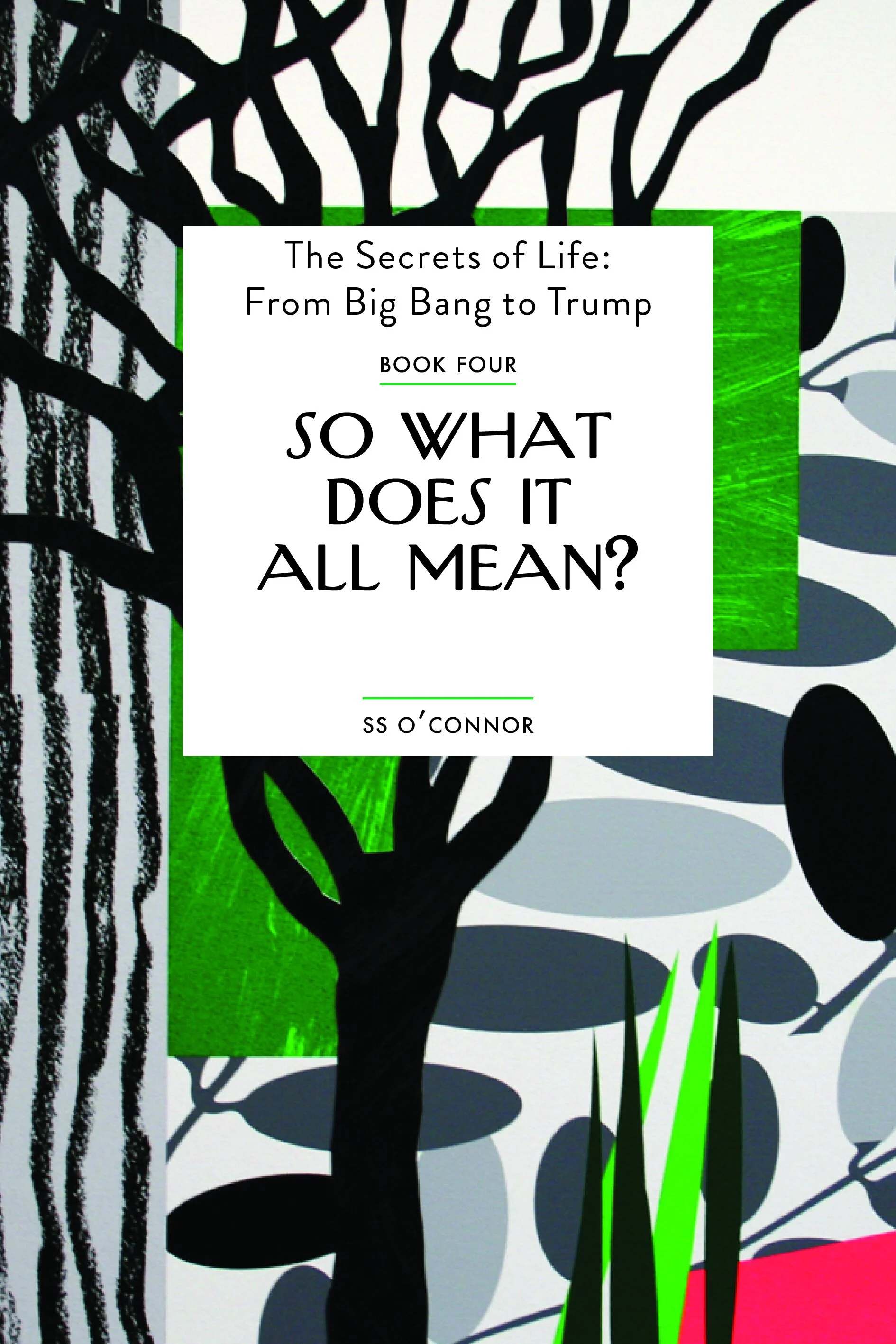Otium Press was founded by SS O’Connor in 2022 to publish his Secrets of Life series.
Although originally intended only for these titles, there are now plans to publish further books written by other authors in the Otium stage of their lives.
The Secrets of Life Quartet: From Big Bang to Trump
Are you one of those people who think that life is just a vile struggle for existence… where the strongest win by being bloodier in tooth and claw than the competition? And that maybe it’s a short step from the natural world to reach the same conclusions about ourselves - that it’s the selfish types who always come out on top by never giving a fig about others, or society, or where the world is heading?
Well, think again, argues SS O’Connor in ‘The Secrets of Life: From Big Bang to Trump.’
A successful venture capitalist by background, O’Connor sets out to use the same analytical skills he employed in his business life to condense down the gigantic mass of genetic, biological, anthropological, game theoretic and historical evidence into a highly readable narrative to show that under the obvious requirement to take one another’s energy - and the endless and violent conflict this often involves - there’s always been a deeper current that's driving living things to higher and higher levels of cooperation.
The series’ contention is that there are actually very few ‘secrets’ in life. Rather, it’s possible to see that from the split second of Big Bang, right up to our present attempts to make the world a better place, everything that’s alive has been trying to find strategies to survive the iron Laws of Thermodynamics. This means they have to work together to make more from less, and therefore to overcome the constant threat of destructive, entropic forces. If Douglas Adams’ fictitious answer to the meaning of life was 42, then O’Connor shows how accurate this was… but only if the question is ‘what does 15 and 15 add up to?’
And so, he says, everywhere one looks across the long history of life, from chemical compounds to cellular interactions, from symbioses to the counter-intuitive power of altruism, and from primitive societies on to our present-day culture wars, survival and success have always come from the creation of win/win solutions. But what are the strategies that things have used to achieve this? And is there a logic behind it all?
By dividing the story into four books, The Secrets of Life O'Connor brings his amateur's perspective to a huge range of specialist knowledge to piece the story of life together. Just as Darwin showed that the mechanism that led to the complexities of life was actually extraordinarily simple, so O'Connor attempts to explain how the same forces have been at work throughout its entire history are similarly rooted in a profound, binary choice. Yes, all of life’s strategies have flaws that can be exploited, and nothing is ever truly secure or able to survive forever. Yet, as O'Connor's story concludes, the real effect of all this failure is to make life itself immortal.
Why does the gene behave like a hedge fund manager?
Why are mutations like a gambling scam?
Why does nothing ever become top dog in life and win forever?
Humans only arrived after 99.99% of the time there’s been life on earth. So what was here before us? And how did these species, and the evolutionary process that created them, end up with the unpromising creatures that were our ancestors?
In this, the first book of The Secrets of Life quartet, SS O’Connor brings his outsider’s, questioning eye to reveal the great forces that lie behind life: from the laws that arose with Big Bang, through to the ‘decisions’ that organisms make to determine their chances.
But how did everything come about? And what made some life forms succeed - while others would join the 99.9% of species that appeared, yet went on to become extinct? The story goes right back to our single-celled forebears - the only things that were on the planet for 80% of its existence, and then continues as it lays out the ways that successive transmissions built increasing complexity, and how the resulting species found their synergistic ways of coexisting.
In an easy-going, conversational style, O'Connor explains in lay-man's language how the gene is the great conductor of life’s orchestra, how it helped millions of life forms to refine themselves - yet why it also sees failure, death and extinctions as opportunities rather than disasters.
Last, the book tells the story of the men who unpicked the mysteries, what they meant by fitness and ‘the fittest’, but why they continued to be baffled by organisms that broke the rules by helping each other. Why would some even choose to be sterile when producing the next generation was the overriding compulsion in life? And how does the answer to this question explain why altruism is the proof for the ‘gene-based theory of evolution’ - and why cooperation would become the strongest force in life?
How is it we humans only arrived after 99.995% of the time there’s been life on earth - and yet we’re now so dominant?
If mutations take generations to have an effect, how did we manage to change so completely in just a blink in time?
And why were our rulers and societies always so horrible - yet we endlessly put up with them?
Book One of The Secrets of Life quartet began the long narrative of existence by showing how the forces that Big Bang unleashed drove the Earth’s evolutionary developments, and how after 3.8 billion years of life and the extinction of many billions of species, our obscure forest-dwelling ancestors emerged in East Africa. Yet what, Book Two asks, were the steps that led to us humans becoming so totally different to anything that had appeared before? If we really were just another kind of animal off the production line of life, then what were the revolutions that turbo-charged our unique abilities?
How did we evolve so that we could alter ourselves in an instant, and avoid being stuck in an evolutionary niche like every other organism? How did we manage to create the intelligence and insights that allowed us to make our own decisions in life? And where did the free will come from that would let us override the drives of our animal pasts?
We alone of all the world’s species have ever been able to predict the future, and then change our behaviour so that it suited our ambitions. But how did we grow our brains and imaginations so greatly that we could achieve this? And only we have evolved the capacity to reject the genetic instructions that shaped us. But why do we think this helps - and how has it affected our lives? Now, using the same easy-going conversational style of the other books in the series, O'Connor answers these and other questions to explain how we evolved to break away from everything that had existed before us. And yet why the effects of our heritage so often still emerge in how we exist.
Why is life like a poker game?
How did a failed robbery help to explain human nature?
Why are we so certain bad men will win - and yet we’re so wrong?
In this, the third volume of The Secrets of Life quartet, SS O’Connor once more uses his easy-going, conversational style to explain how the science of decision analysis developed, and why it has come to show us not only the reasoning behind how humans arrive at their choices in life, but why so much of the apparently bizarre behaviour of the natural world has the same hard logic to it. Instead of the confusion and chaos one might expect, O'Connor lays out how the options organisms face when they interact can actually be analysed, and how we humans then refined this process through the addition of our intelligence and language skills.
Starting with the extraordinary new ways of thinking that Adam Smith opened the world’s eyes to, the book progresses to the 20th century - and shows how the mathematical reasoning behind our thought processes was revealed at a time when the very future of the world was at stake. From these earliest investigations, through to the fevered disagreements of later experts, this third volume of the Secrets of Life series explains how the science of game theory illuminates the reasons for our behaviour. In particular, the book provides insights into how the interests of the individual should be balanced against those of the group, and why the mechanism of trading would extend far further into our lives than we could ever have imagined.
As the story unfolds it becomes ever clearer how cooperation has evolved to be the catalyst at every level of life. It explains how it was the force that built our world, and why it would settle so deeply in our hardwiring that it's become instinctive and innate in us. Perhaps most pleasingly, the same logic also shows that the benefits of collaboration are always bound to ratchet upwards - and how this will inevitably lead humans to ever-increasing levels of moral behaviour.
Why are humans neither ‘good’ nor ‘bad’?
How can so much chaos and confusion in the world actually lead to order?
Why are we so often wrong when we’re asked if the world’s getting better?
In this, the last book in The Secrets of Life quartet, SS O’Connor pulls together the threads of genetic and cultural evolution, and then adds to these the conclusions of evolutionary game theory. As he does this, he ends with an intertwined narrative that explains why so many of the phenomena of our existence may not be the mysteries we think they are, but could in fact have the same underlying logic to them.
By examining the great currents at work in our collective story, the role that competition and cooperation have always played in the development of the world, and why each behavioural strategy is rational in what it’s attempting to achieve, the book shows that the same cycles of collaboration and destruction have been present since time began. But while the success of these strategies may ebb and flow, it is their interaction that results in the balance and order we see around us.
This current is also the consistent vector of our human history. Although we may have animal origins, and are also driven by the same need to respond to the profound Laws of Thermodynamics, we have developed our culture to the point where we can now choose to overrule so many of the instructions of our genes.
Why do we do this? What are the problems that arise from our free will? How have we come to realise that self-interest is quite different from selfishness? Why have we become obsessed with the need for fairness and trust in our societies? And how have these forces resulted in us making the world a better place?
Few of us believe this can be the case. But as the evidence of our progress becomes ever clearer, the series concludes by showing us why we are often wrong in our view of each other, and why we’re so frequently mistaken in our pessimism about the future.

